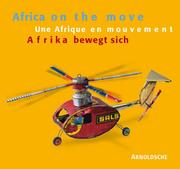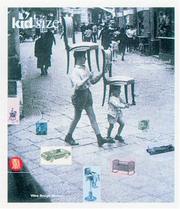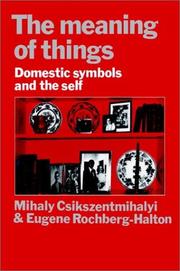| Listing 1 - 8 of 8 |
Sort by
|
Book
ISBN: 902527109X Year: 1980 Publisher: Aartselaar Helmond A.W. Bruna & zoon Helmond
Abstract | Keywords | Export | Availability | Bookmark
 Loading...
Loading...Choose an application
- Reference Manager
- EndNote
- RefWorks (Direct export to RefWorks)
Book
ISBN: 9051215681 Year: 1997 Publisher: Baarn Tirion
Abstract | Keywords | Export | Availability | Bookmark
 Loading...
Loading...Choose an application
- Reference Manager
- EndNote
- RefWorks (Direct export to RefWorks)
voedsel --- keukengerei --- Middeleeuwen --- 17de eeuw --- 18de eeuw --- 19de eeuw --- geschiedenis --- voeding --- 906.3 --- tafelgerei --- geschiedenis, huiselijk en maatschappelijk leven, maaltijd en keuken --- History of civilization --- cultuurgeschiedenis --- productdesign --- 17de eeuw. --- 18de eeuw. --- 19de eeuw. --- Middeleeuwen.
Book
ISBN: 050001874X Year: 1997 Publisher: London Thames & Hudson
Abstract | Keywords | Export | Availability | Bookmark
 Loading...
Loading...Choose an application
- Reference Manager
- EndNote
- RefWorks (Direct export to RefWorks)
772.1 --- 906.6 --- baden --- badkamers --- cultuurgeschiedenis --- productdesign --- productdesign, historisch, algemeen --- geschiedenis, huiselijk en maatschappelijk leven, kind, spel en speelgoed --- bathrooms --- hygiëne --- sanitaire installaties --- badhuizen --- 747.2 --- History --- history [discipline] --- Architecture --- Housekeeping --- Hygiene. Public health. Protection --- Applied arts. Arts and crafts

ISBN: 3897902133 Year: 2004 Publisher: Stuttgart Arnoldsche
Abstract | Keywords | Export | Availability | Bookmark
 Loading...
Loading...Choose an application
- Reference Manager
- EndNote
- RefWorks (Direct export to RefWorks)
Toymakers --- Toys --- Recreation. Games. Sports. Corp. expression --- assemblages (kunst) --- speelgoed --- toegepaste kunsten --- Africa --- 624.9 --- Afrikaans speelgoed --- 433.6 --- 772.1 --- 906.6 --- Afrika --- blik --- cross-cultureel --- productdesign --- recyclage --- opvoeding in de praktijk, kind, spel en speelgoed --- productdesign, historisch, algemeen --- geschiedenis, huiselijk en maatschappelijk leven, kind, spel en speelgoed --- Amusements --- Children's paraphernalia --- Infants' supplies --- Miniature objects --- Toy makers --- Artisans --- Artists --- Toy making
Book
ISBN: 9027427445 Year: 1995 Publisher: Utrecht Spectrum
Abstract | Keywords | Export | Availability | Bookmark
 Loading...
Loading...Choose an application
- Reference Manager
- EndNote
- RefWorks (Direct export to RefWorks)
In deze nog altijd actuele studie over de sociale herkomst van vormen en gedrag laat Elias zien hoe de regels voor aanvaardbaar gedrag in de maatschappelijke bovenlagen zijn ontwikkeld. Vanaf de late middeleeuwen tot het begin van de negentiende eeuw vinden ingrijpende veranderingen plaats, die onze normen en waarden tot op de dag van vandaag bepalen.Op grond van historisch materiaal laat Elias zien hoe onze gedragsvormen, en de daarmee corresponderende manieren van denken en voelen, zijn beïnvloed door de ontwikkeling van de maatschappelijke verhoudingen. Verschuivende machtsverhoudingen spelen daarbij een doorslaggevende rol.
#SBIB:316.20H14 --- Grondleggers van de sociologie: Duitsland --- #GROL:SEMI-130.2 --- #GROL:SEMI-930.85 --- #SBIB:012.IEB --- psychologische aspecten --- Sociale psychologie. --- psychologische aspecten. --- Beschaving --- Cultuurgeschiedenis. --- Psychologische aspecten. --- #VCV monografie 1999 --- Developmental psychology --- History of civilization --- Sociology of culture --- Western Europe --- 906.3 --- 303.89 --- sociologie --- cultuursociologie --- geschiedenis --- cultuurgeschiedenis --- sociale geschiedenis --- eten --- tafelgerei --- slapen --- Hygiëne (Vuil zijn, Zich wassen) --- Seksualiteit --- geweld --- geschiedenis, huiselijk en maatschappelijk leven, maaltijd en keuken --- sociologie, algemene en sociale ecologie, overige onderwerpen --- hygiëne --- 310 --- civilisatie

ISBN: 8881182548 Year: 1997 Publisher: Weil am Rhein Skira
Abstract | Keywords | Export | Availability | Bookmark
 Loading...
Loading...Choose an application
- Reference Manager
- EndNote
- RefWorks (Direct export to RefWorks)
Age group sociology --- Applied arts. Arts and crafts --- Children --- Material culture --- Children's furniture --- Toys --- Games --- Play --- Exhibitions. --- (069) --- 749:688.7 --- Industrieel design ; meubelen ; voor kinderen --- Meubelkunst ; m.b.t. kinderen --- Speelgoed --- Tentoonstellingscatalogi ; Weil am Rhein ; Vitra Design Museum --- Thema’s in de kunst ; kinderen --- 749 --- kinderen --- kindermeubilair --- meubelontwerp --- speelgoed --- 433.6 --- 772.1 --- 906.6 --- bedden --- cross-cultureel --- educatief speelgoed --- kinderbedden --- kindermeubelen --- kinderwagens --- meubelen --- productdesign --- wiegen --- (Musea. Collecties) --- Meubelkunst en design ; speeltuinen, speelgoed, meubels voor kinderen --- meubelkunst, meubelontwerp --- opvoeding in de praktijk, kind, spel en speelgoed --- productdesign, historisch, algemeen --- geschiedenis, huiselijk en maatschappelijk leven, kind, spel en speelgoed --- Exhibitions --- Jouets --- Expositions --- Recreations --- Recreation --- Amusements --- Culture --- Folklore --- Technology --- Children's games --- Games, Primitive --- Games for children --- Pastimes --- Primitive games --- Entertaining --- Physical education and training --- Sports --- Childhood --- Kids (Children) --- Pedology (Child study) --- Youngsters --- Age groups --- Families --- Life cycle, Human --- Baby furniture --- Infants' furniture --- Nursery furniture --- Children's paraphernalia --- Furniture

ISBN: 0521239192 052128774X 1107384605 1139167618 9780521287746 9781139167611 9780521239196 Year: 2002 Publisher: Cambridge Cambridge University Press
Abstract | Keywords | Export | Availability | Bookmark
 Loading...
Loading...Choose an application
- Reference Manager
- EndNote
- RefWorks (Direct export to RefWorks)
The meaning of things is a study of the significance of material possessions in contemporary urban life, and of the ways people carve meaning out of their domestic environment. Drawing on a survey of eighty families in Chicago who were interviewed on the subject of their feelings about common household objects, Mihaly Csikszentmihalyi and Eugene Rochberg-Halton provide a unique perspective on materialism, American culture, and the self. They begin by reviewing what social scientists and philosophers have said about the transactions between people and things. In the model of 'personhood' that the authors develop, goal-directed action and the cultivation of meaning through signs assume central importance. They then relate theoretical issues to the results of their survey. An important finding is the distinction between objects valued for action and those valued for contemplation. The authors compare families who have warm emotional attachments to their homes with those in which a common set of positive meanings is lacking, and interpret the different patterns of involvement. They then trace the cultivation of meaning in case studies of four families. Finally, the authors address what they describe as the current crisis of environmental and material exploitation, and suggest that human capacities for the creation and redirection of meaning offer the only hope for survival. A wide range of scholars - urban and family sociologists, clinical, developmental and environmental psychologists, cultural anthropologists and philosophers, and many general readers - will find this book stimulating and compelling.
Dwellings --- Environmental psychology --- Families --- House furnishings --- Self --- Symbolism (Psychology) --- Symbolism in psychology --- Psychoanalysis --- Psychology --- Personal identity --- Consciousness --- Individuality --- Mind and body --- Personality --- Thought and thinking --- Will --- Cognitive ergonomics --- Ecological psychology --- Ecopsychology --- Ecotherapy --- Environmental quality --- Environmental social sciences --- Human factors science --- Psychoeology --- Psychotherapy --- Ecological Systems Theory --- Home furnishings --- Household goods --- Home economics --- Interior decoration --- Family --- Family life --- Family relationships --- Family structure --- Relationships, Family --- Structure, Family --- Social institutions --- Birth order --- Domestic relations --- Home --- Households --- Kinship --- Marriage --- Matriarchy --- Parenthood --- Patriarchy --- Psychological aspects --- Equipment and supplies --- Social aspects --- Social conditions --- Health Sciences --- Psychiatry & Psychology --- Semiotics --- symbols --- behavioral sciences --- symboliek --- House furnishings - Psychological aspects --- Dwellings - Psychological aspects --- Environmental psychology. --- Self. --- Families. --- Psychological aspects. --- 414.9 --- 906.2 --- gedragspsychologie --- huishoudapparaten --- omgevinsgpsychologie --- richtingen in de psychologie, overige --- Geschiedenis, Huiselijk en maatschappelijk leven, huis en huisraad
Book
ISBN: 9055440140 9055440159 9789055440146 Year: 1994 Publisher: Brussel ASLK
Abstract | Keywords | Export | Availability | Bookmark
 Loading...
Loading...Choose an application
- Reference Manager
- EndNote
- RefWorks (Direct export to RefWorks)
politics --- politiek --- history [discipline] --- History of Belgium and Luxembourg --- geschiedenis --- anno 1930-1939 --- Belgique --- België --- Catalogues d'expositions --- Geschiedenis van de nieuwste tijden --- Histoire contemporaine --- Tentoonstellingscatalogi --- Aesthetics --- Arts, Modern --- Popular culture --- Political aspects. --- Belgium --- Politics and government --- jaren 1930 --- sociale geschiedenis --- 1930 - 1940 --- 20ste eeuw --- architectuur --- #BUAR:bibl.de Bock --- 949.3 --- design --- 949.3.035 --- 949.3.09 --- beeldvorming --- #gsdb8 --- #SBIB:949.3H0 --- gelegenheidspublicatie --- maatschappijbeeld --- economische crisis --- massacultuur --- iconografisch materiaal --- KADOC (x) --- economische geschiedenis (x) --- interbellum (x) --- #A9405A --- twintigste eeuw --- maatschappij --- cultuur --- kunst --- onderwijs --- stedenbouw --- 7.037 --- maatschappelijk leven --- jaren 30 --- 935 --- 906 --- Belgie --- Belgische geschiedenis --- binnenlandse politiek --- economische geschiedenis --- arbeidsverhoudingen, collectieve --- -Arts, Modern --- -Popular culture --- Culture, Popular --- Mass culture --- Pop culture --- Popular arts --- Communication --- Intellectual life --- Mass society --- Recreation --- Modern arts --- Beautiful, The --- Beauty --- Esthetics --- Taste (Aesthetics) --- Philosophy --- Art --- Criticism --- Literature --- Proportion --- Symmetry --- geschiedenis van België - België, geschiedenis van --- Geschiedenis van België: interbellum (1919-1939) --- Geschiedenis van de Vlaamse beweging --- Geschiedenis van België: algemeen --- geschiedenis België - 20e eeuw --- huiselijk en maatschappelijk leven --- 20e eeuw --- 94 --- 008 --- 323 --- 308 --- 33 --- 331.15 --- 493 --- Political aspects --- Psychology --- Exhibitions --- Historische en vergelijkende pedagogiek --- 949.3.09 Geschiedenis van de Vlaamse beweging --- 949.3.035 Geschiedenis van België: interbellum (1919-1939) --- Historische en vergelijkende pedagogiek. --- Culture --- 935.2 Geschiedenis van België ; 20e eeuw - 21e eeuw ; c. 1918 - c. 1940 --- cultuurgeschiedenis --- interbellum --- industrie --- consumptie --- arbeid --- opvoeding --- stedebouw --- sierkunsten --- productdesign --- Radio broadcasting Aesthetics --- sociale geschiedenis. --- 1930 - 1940. --- 20ste eeuw. --- België. --- jaren 1930.
| Listing 1 - 8 of 8 |
Sort by
|

 Search
Search Feedback
Feedback About UniCat
About UniCat  Help
Help News
News